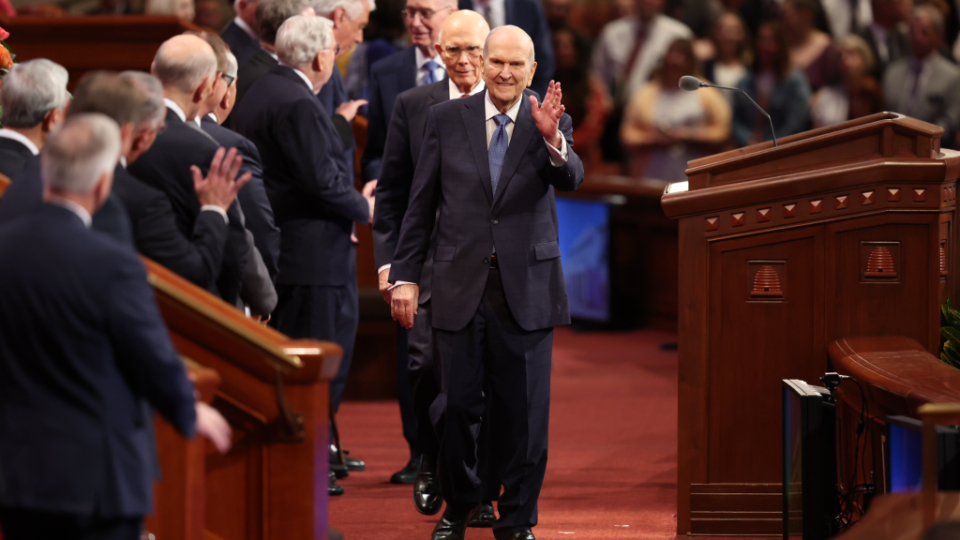President Russell M. Nelson, of The Church of Jesus Christ of Latter-day Saints, waves to other general authorities prior to the Saturday morning session of the 192nd Semiannual General Conference of The Church of Jesus Christ of Latter-day Saints in Salt Lake City on Saturday, Oct. 1, 2022. (Jeffrey D. Allred /The Deseret News via AP)
SALT LAKE CITY (AP) — Russell M. Nelson, the president of The Church of Jesus Christ of Latter-day Saints, told members of the faith on Saturday that abuse was “a grievous sin” that shouldn’t be tolerated and would bring down the wrath of God on perpetrators.
Though the leader of the nearly 17-million member faith did not mention it directly, the remarks were the first on abuse from a senior church leader since The Associated Press published an investigation into how the church handles reports of sexual abuse when brought to its attention.
“Let me be perfectly clear: Any kind of abuse of women, children or anyone is an abomination to the Lord,” Nelson, who members of the faith believe is a prophet, said in Salt Lake City at a church conference.
The AP’s investigation found the hotline the church uses for abuse reporting can be misused by its leaders to divert accusations away from law enforcement and toward church attorneys. The story, based on sealed records and court cases filed in Arizona and West Virginia, uncovered a host of concerns, including how church officials have cited exemptions to mandatory reporting laws, known as clergy-penitent privilege, as a reason to not report abuse.
Since its publication, the church has said the investigation mischaracterizes its policies, while underlining how its teachings condemn abuse in the strongest terms. Influential church members have historically fought legislative efforts to close the loophole exempting clergy from mandatory reporting requirement. The church has not said whether it will fight reforms lawmakers plan to propose next year.
The church has historically used its twice-yearly conference to set a tone for its members, reflect on current events and announce changes in doctrine. Nelson’s remarks on Saturday echoed the statements the church has released since the publication of the AP’s investigation — condemning abuse, while also defending the church’s policies.
“For decades now, the Church has taken extensive measures to protect — in particular — children from abuse,” Nelson, the church’s 98-year-old president, said sitting on a stool behind a conference center lectern, imploring listeners to research church policy themselves.
Nelson described abuse as an influence of “the adversary,” employing a term the church frequently uses to describe forces that oppose the gospel and its teachings.
Amid the church’s insistence that reporting mischaracterizes its sexual abuse hotline, Nelson also said “the adversary” worked “to blur the line between what is true and what is not true.”
Anti-racism was also a focal point of the opening day of the conference, which is broadcast to church members around the world.
Todd D. Christofferson, a high-ranking church official and member of the Quorum of the Twelve Apostles, acknowledged that for much of the church’s history, it has been dominated by white North Americans, yet noted its membership had steadily diversified.
It has been “long prophesied,” Christofferson said, that the church would have “members from every nation, kindred, tongue.”
“We cannot permit any racism, tribal prejudice, or other divisions to exist in the latter-day Church of Christ … As our church population grows ever more diverse, our welcome must grow ever more spontaneous and warm,” he said.
The church has long reckoned with a history of treating people unequally based on their race. It did not grant Black members full access to the church rituals or priesthood rights until 1978 — 14 years after the Civil Rights Act.
Christofferson’s remarks came after, for the first time in church history, a Black woman spoke at the conference. Tracy Y. Browning, who was appointed to an an all-women leadership panel focused on families and children earlier this year, devoted her remarks mostly to spiritual matters, imploring listeners to expand Jesus Christ’s role into their lives.
The church has in recent years expanded its partnerships with U.S.-based groups like the NAACP and focused on growing its ranks on the African continent, where it has 5 temples open and 17 planned or under construction.
Ronald A. Rasband, another high-ranking church official, spoke of “flooding the earth with the Book of Mormon” and recounted meeting and gifting the book to leaders in Lesotho and Mozambique.

